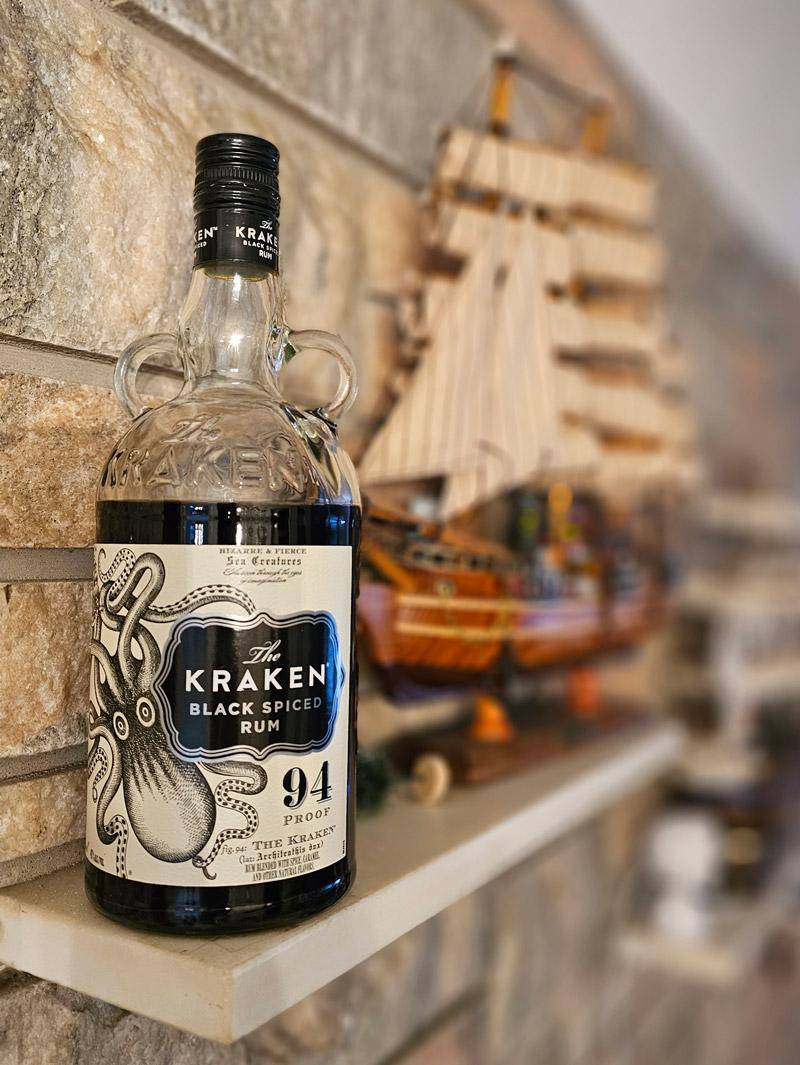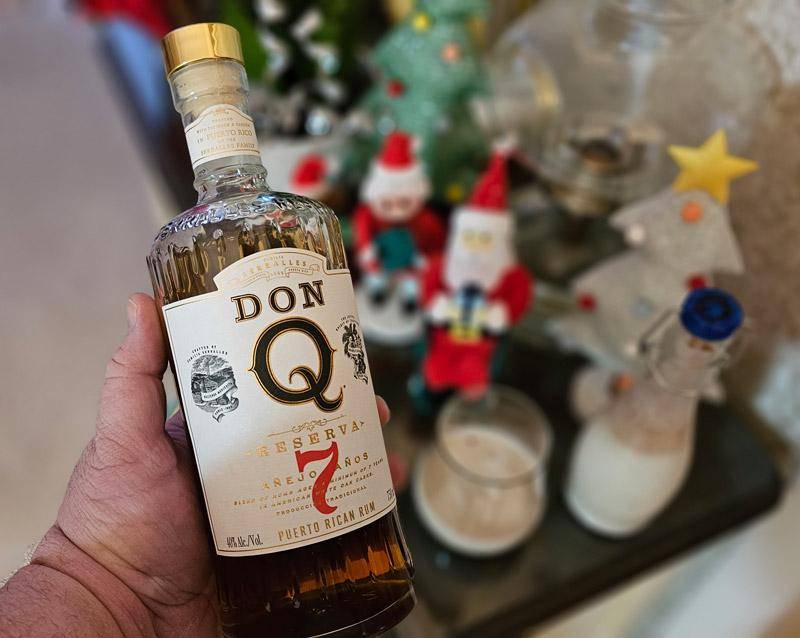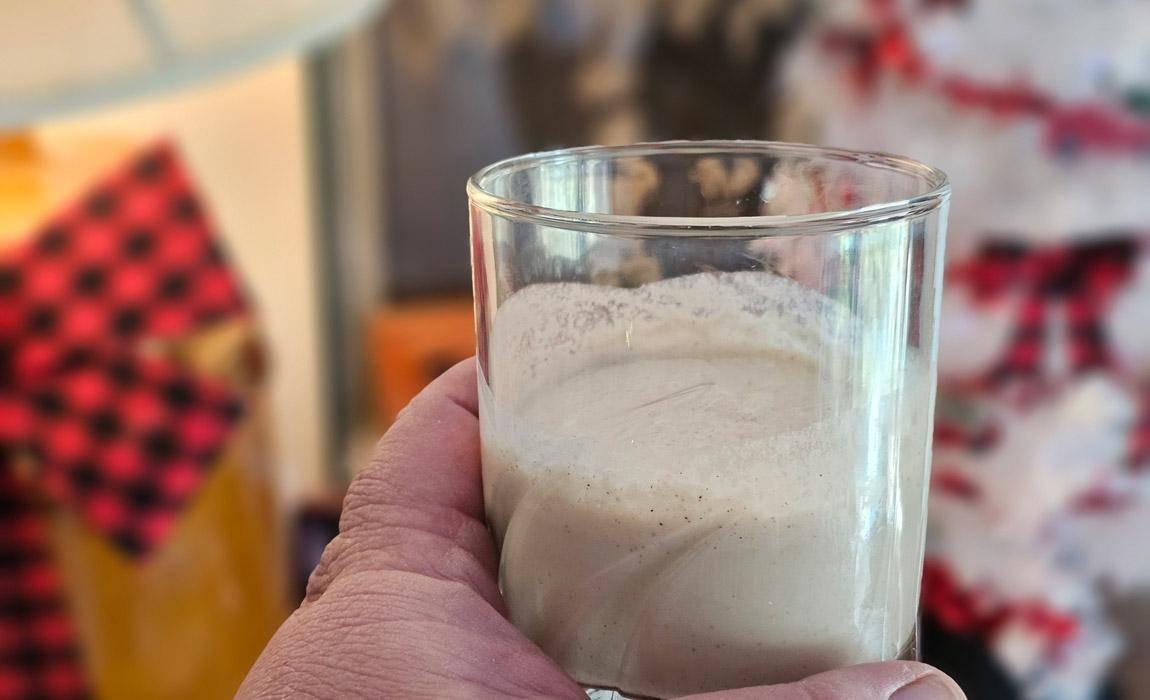I recently heard a saying that great storytellers never finish the tale because they fear they will lose their value if all the secrets are shared. That same thing seems true for good holiday recipes passed down from mother to daughter and father to son. In my wife and I's case, though - neither of us has a Puerto Rican family to rely on and I swear the person who was responsible for getting us hooked on her coquito deliberately omitted an ingredient or a key process. Over the years, Heather has continued to research and experiment in a quest to create if not the PERFECT Puerto Rican Coquito ... at least one that is uniquely ours and a holiday tradition that we both enjoy making, drinking, and sharing with others.
The comparison to eggnog is unavoidable here but aside from a superficial glance, these two drinks are actually quite different. However, the most notable differences are that eggnog has eggs and sugar, tends to be far sweeter, more "creamy", heavier, and traditionally uses brandy (though rum and bourbon are popular too). While on the other hand, coquito embraces the essence of Puerto Rico and should only be made with rum and prominently features coconut milk alongside evaporated and condensed milk. This gives it a lighter, easier-to-drink, more fun experience that will take you to the streets of San Juan and the gentle tropical breezes ... if only for a moment.
One of the debates that we have every year is which rum to use ... is that the secret that we've been missing? Do we really need to soak cinnamon sticks in white rum for a week before blending all the ingredients together or can we just take a short cut and use a spiced rum instead?
So ... this year, we're going to try out three different rums and compare them to see if our classic self-spiced Bacardi Superior reigns supreme or if Don Q Reserva 7 Anos Rum or even 94-proof Kraken Dark Spiced Rum proves to be the winner here.
First though, let's take a deeper look at the history of eggnog vs coquito ...
History and Origins of Eggnog and Coquito
Unpacking the rich heritage of these drinks, eggnog has a well-documented history dating back to colonial America in the 1700s. Meanwhile, the inception of coquito is a much more recent creation, having it's origin popping up around Puerto Rico less than 100 years ago.
Eggnog's Colonial Beginnings:
References to 'eggnog' first surfaced in 1775, commonly linked to joyous festivities. It was a colonial evolution of the medieval British drink, posset, that was made with hot milk curdled with wine or ale and flavored with spices. It was, among other things, believed to have medicinal properties, and monks were known to drink it mixed with eggs and figs.
Even George Washington enjoyed eggnog at Mount Vernon during the holidays. While this recipe below is said by historians to not be authenticatable to him, the following is authentic to the period according to The Farmer's Almanac:
“One-quart cream, one-quart milk, one dozen tablespoons sugar, one-pint brandy, ½ pint rye whiskey, ½ pint Jamaica rum, ¼ pint sherry – mix liquor first, then separate yolks and whites of 12 eggs, add sugar to beaten yolks, mix well.
Add milk and cream, slowly beating. Beat whites of eggs until stiff and fold slowly into mixture. Let set in cool place for several days. Taste frequently.”
Today though, most people find it far easier to buy it in the grocery store simply... but if you ever get a chance to try it fresh ... it is oh so much better!
Coquito's Caribbean Birth:
Coquito, or 'Little Coconut', emerged in Puerto Rican cookbooks in the mid-1900s and has become an essential part of Caribbean American holiday traditions. There is some speculation that just as eggnog's origin evolved from British bringing their holiday celebrations to the new world, that coquito evolved from Americans bringing their traditions to Puerto Rico. Others suggest that it evolved from a rough drink created by sugar cane farmers and millworkers who combined ingredients on hand - rum and coconut milk - to create an easy-to-make libation.
However, while it's possible that families were creating the concoction themselves ... it was only documented officially by the mid-20th century in two different cookbooks - Cocine a Gusto and The Puerto Rican Cookbook
While their histories are different, the commonalities in how they're made connect these two different holiday favorites, creating a bond of shared heritage and cultural identity.

White Rum? Spiced Rum? Or Dark Spiced Rum?
So here's where I'm going to let you down a bit ... there's no right way. In fact, we also made a version that had no rum at all since Jim can't drink but we wanted to share our Christmas tradition with him in the hospital. But first, let's share Heather's coquito recipe ...
Heather's Coquito Recipe:
- 1 cup coconut milk
- 1 cup sweetened condensed milk
- 1 cup evaporated milk
- 1.5 cup rum
- .5 Cup Water
- optional - egg yolks (we removed this but others use 1-4 egg yolks in a similar recipe)
- optional - cinnamon sticks in each bottle or teaspoon of high-quality, fresh ground cinnamon when blending
Combine all of the milks, water, and rum in a blender.
Place cinnamon powder or stick into bottles. If you are using a spiced rum, you may optionally avoid the extra cinnamon and instead add it as a garnish to the glass later.
Use a funnel to pour into glass bottles with stoppers that can be used to hold the coquito in the refrigerator.
So ... how did the various rums we tried turn out? Let's take a look ...

Which Rum Was The Best For Coquito?
If I had to pick - I'm going to say that the Don Q Reserva Anejo 7 Anos rum was objectively the winner here - though Kraken offered a surprisingly good alternative for folks who want to amp things up a big, while the good ole' classic Bacardi Superior that we self spiced by infusing with cinnamon continues to be the tried and true family favorite for no other reason than tradition and authenticity.
| Rum Type | Flavor Notes | ABV | Country of Origin | Coquito Tasting Notes |
|---|---|---|---|---|
| Bacardi Superior White Rum ($12) | Floral and fruity with notes of tropical fruits. When infused with fresh cinnamon sticks it took on a more robust flavor that was raw, unpolished, and authentic. | 40% | Puerto Rico | This is the classic, and it is probably what we will go back to since it just "tastes right". |
| Don Q Reserva 7 Anos ($30) | Warm kitchen spices like vanilla, cinnamon, honey, oaky notes, and a touch of dried dates and raisins. | 45% | Puerto Rico |
While I enjoyed my self-spiced rum in the same way that I enjoy fried bologna sandwich or fresh baked cookies, Don Q was perfect - Ready to Go - alternative if you just want to make a quick batch of coquito without having to spend time shelf space waiting for the rum to soak into the cinnamon. Additionally, the flavor profile here was well-balanced without being overwhelming. |
| Kraken Black Spiced Rum ($20) | Spices, toffee, pepper, clove, caramel, creamy coffee, fruits, vanilla, honey, ginger | 47% | Trinidad & Tobago |
I was surprised at how well Kraken worked ... Initially, I rejected their request to be considered but it turned out pretty well. I think ultimately, though, it's a bit too hard-hitting for the balanced spice, sweetness, and rum flavors I enjoy traditionally with coquito. However, it wasn't unpleasant, and I'm going to say that while Don Q is the Latin Jazz Coquito, Kraken is the Rock and Roll Coquito! |
Ultimately, all three of these rums worked great for coquito and the flavor really depends on personal preferences. Just remember not to overdo it ... if you want to do shots of Kraken or sip some Don Q on the rocks ... make yourself another drink, don't ruin the coquito by drowning it in booze!
More Modern Variations and Flavors
In recent times, both eggnog and coquito have seen changes in their traditional recipes, introducing a variety of innovative flavors. Eggnog now comes with a touch of pumpkin, coffee, and strawberry, while coquito has been refreshed with fresh coconut juice in the Caribbean and coconut ice cream in Cuba. A look at the regional variations of these beverages underlines the wide array of flavors, giving an extra layer to these cherished holiday drinks. From Mexico's eggy coquito to the pistachio-infused eggnog of North America, these new interpretations cater to diverse taste preferences and also build a sense of community, as everyone can find a version suited to their distinct tastes.
No matter where you're from or what your traditions are, I love to try new things and as a distiller once told me ... If you like it, drink it!
